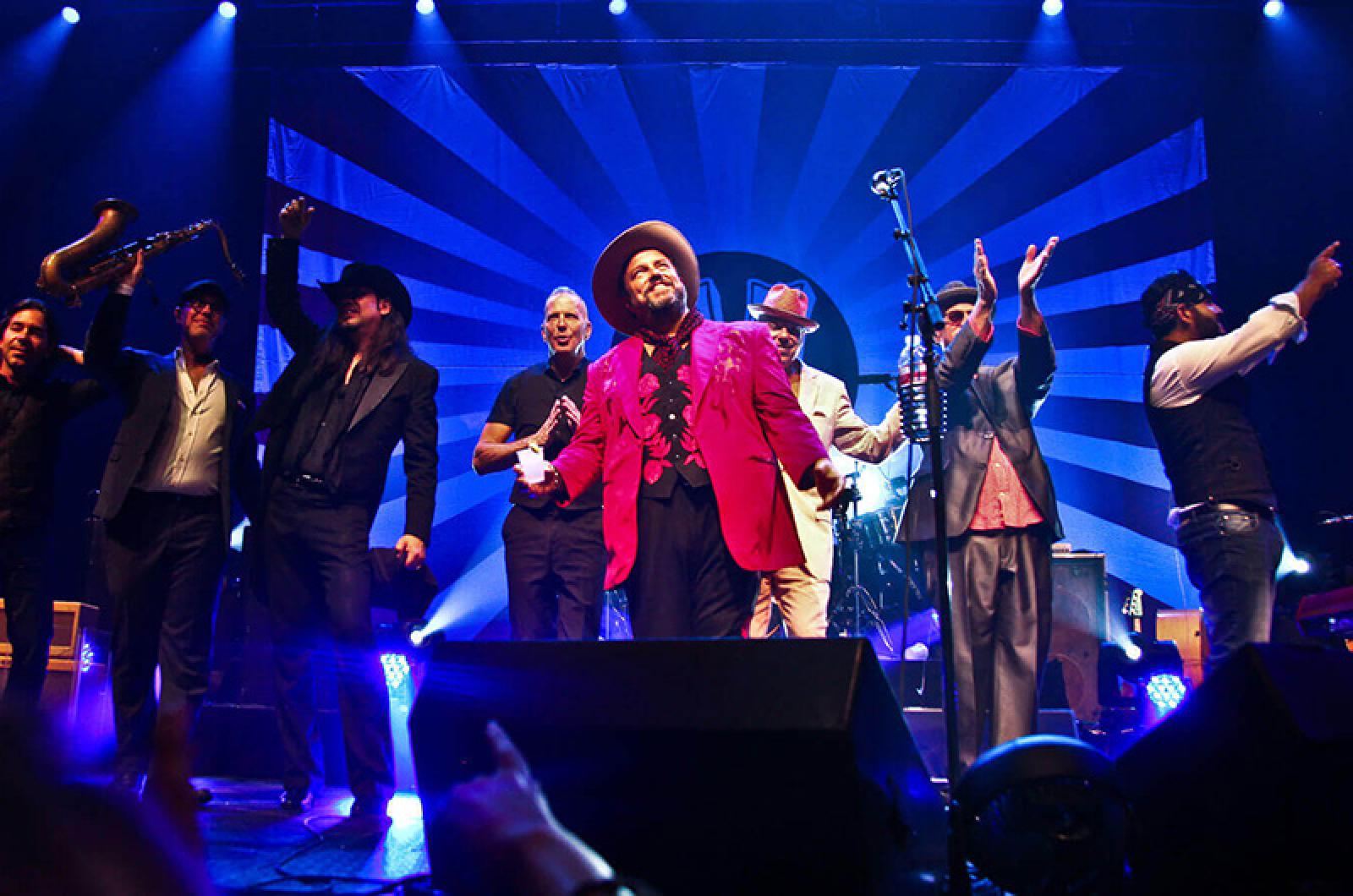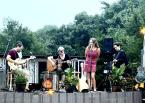Raul Malo is leaving for Europe in an hour, where he and his band the Mavericks will headline festivals in Spain and Holland. “There are 12 of us,” he says with a laugh. “Eight onstage, four to keep us together, and 30 pieces of luggage.”
That luggage will be landing on the Vineyard July 18 for a show at the Performing Arts Center. With a horn section, an accordion player, the always colorful keyboardist Jerry Dale McFadden, precision drummer Paul Deakin and musically flamboyant guitarist Eddie Perez, it will be a night of celebration, revelry, great style and no doubt copious amounts of dancing.
In 1991, when the multi-culti band from Miami’s punk scene ignited a bidding war in Nashville it was obvious there was something special about the four-piece band that leaned heavily into the country classicism of Patsy Cline and the rockabilly of Elvis. And now, 25 years after the release of From Hell To Paradise, the band fronted by the son of Cuban emigres is even more vital, more powerful and more in demand.
“It’s a philosophy,” Malo explains, “a way of approaching [all of this]. I always tell young musicians, ‘Do you want to be an artist? Or do you want to be famous?’ Cause they don’t always intersect, and if you want to be famous, that’s a very different trajectory and set of priorities.”
Mark Hagen, the BBC producer who first programmed the then-progressive country band’s Dance The Night Away video on television, remembers the first time he heard Malo sing.
“It was a revelation,” he said. “My first impressions were that his voice came from everywhere and nowhere at the same time. You could hear Roy Orbison in it, but you could also hear Louis Prima and Elvis and Doug Sahm. There was a little of the grit of George Jones, and the melancholy of Sinatra, but also the lightness of Dean Martin or Bobby Darin. But crucially it was absolutely contemporary at the same time — the influences were there, but they weren’t the thing.
”And that was true for the whole band. It seemed like they could play anything, from any era, and make it sound entirely modern and have the most fun doing it.”
Today those influences, especially the Louis Prima, Dean Martin and Cuban music of Malo’s roots, are strong. Whether an eight-minute desire-heavy tango like Call Me When You Get To Heaven, the juking Stories We Could Tell, an almost surf romanticism on Springsteen’s All that Heaven Will Allow, or the spaghetti Western eroticisim of Come Unto Me, there is a strong vein-sensual charge to the Grammy winners futuristic retro. Malo’s tenor has a way of flexing some of the most muscular chops, even as it soars by the octave.
“A long time ago, when I was just soaking in music, and I couldn’t even describe it, I’d listen for hours and hours, just studying everything that was going on,” Malo remembers. “I had this epiphany listening to Elvis’ It’s Now (Or Never), the way the voice moved in the track. My Mom turned around and played me the Italian aria it came from, and that put into my head what I couldn’t put in words: that common thread that ran through music, that made it [visceral].
“That moment of Now or Never and Oh Solo Mio confirmed for me the universal language of music. It also showed me how things intertwine, and can be played so many ways.”
For Berea College’s Appalachian Studies chairman and acclaimed novelist Silas House that connectedness was revelatory. “As a young man in Eastern Kentucky, I’d never heard any Cuban music or Tex-Mex, but the Mavericks led me to make my musical taste much more eclectic.
“I can’t think of another country group that put such rich diversity on display, not only physically, but sonically with the mix of Latin, Tex-Mex, traditional country, and other elements. They even put Flaco Jimenez on the country charts! Their very existence as a country band is hugely important, because visibility like that matters and has the ability to broaden people’s minds.”
That ability to merge, mend and morph led the band to Cuba for the PBS episode of Great Performances titled Havana Time Machine. A handful of pictures that work as a visual love song to the nation his parents fled during the Castro Revolution is clearly an emotional highpoint for the man whose band has sold out six nights at the UK’s Royal Albert Hall, as well as Wembley Arena.
“The trip had a lot of significance,” he admits, turning serious. “Feelings run high [about Cuba]. That PBS show was never shown in Miami. For them, it was...”
He pauses. “To get permission to shoot, you have to work with the government, and to some people it looks like you’re appeasing the government. Even though the overall response to the show has been positive, for Miami it is something else altogether.”
For him, though, it was a homecoming beyond dreams. “Cuba is a beautiful mess. There’s so much beauty everywhere you look, and the spirit of the people is undiminished. They love so passionately. They enjoy the little things, because that’s all they have.
“The big things are just gone; the embargoes have done a number. The economy is a shambles. They depend on Venezuela for oil, and their economy is even worse. And yet the people don’t worry about what they don’t have. You can see it when we’re playing.”
Indeed, the full band footage at Los Jardines de la Tropical, included in the special and their video for the snaking Easy As It Seems, shows a crowd consumed by music. The effervescence of the moment turns the crowd into a churning, swirling bubble of joy.
Be aware: if you’re going to see the Mavericks, high spirits will erupt. With one of the tightest bands working today, they knead sexual frisson, myriad poly-rhythms and euphoria into an intoxication that defies mere language.
But there’s also the subtle undertow of consciousness beneath the surface, making the gorgeous dance band who evokes the great swing and jazz bands as much Ray Price’s lush country or Sun Records Memphis Rock & Roll more than great fun.
“It’s not overtly political,” Malo says, having just cleared security in Denver. “It was the humanist piece that we bring. My aunt protested the Castro regime, getting arrested and going to jail, then coming to America. That was her lens. I’m certainly not afraid, but I also know we get all walks of life at our shows, liberals, conservatives, everything in between. I want to get people to relate as human beings first.
“When the mass shootings were going on [at shows around the world], I’d say ‘People are getting killed for doing what we’re doing tonight, and this song is for all the families who lost loved ones, because that hole will be forever.’ Then we’d go into How Do You Mend a Broken Heart, and there wouldn’t be a dry eye in the house. We were in some very red states, Texas where the Second Amendment is serious business, but when you take it to that level, everyone feels it.”
Malo greets the gate agent, thanks her for taking his ticket. As he boards he offers a final thought, “Look, the party is what brings them in. Everybody’s invited, and everybody gets to feel good. Before you know it, republican, democrat, independent, they’re all dancing and high five-ing each other, buying one another drinks. That’s better than the other way, when they’re screaming and insulting each other.
“I think if you hit people over the head, lecture them, they’ll tune out. But you sing Dylan’s The Times They Are A-Changing, and you raise your right fist, and everyone else raises their fist, too, that’s powerful.”
The Mavericks perform on Wednesday July 18 at the Performing Arts Center at the regional high school, as part of the Martha’s Vineyard Concert Series. For tickets and information, visit mvconcertseries.com.







Comments
Comment policy »